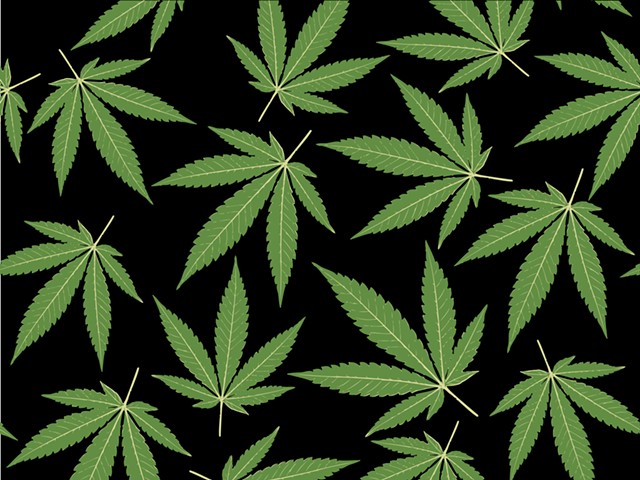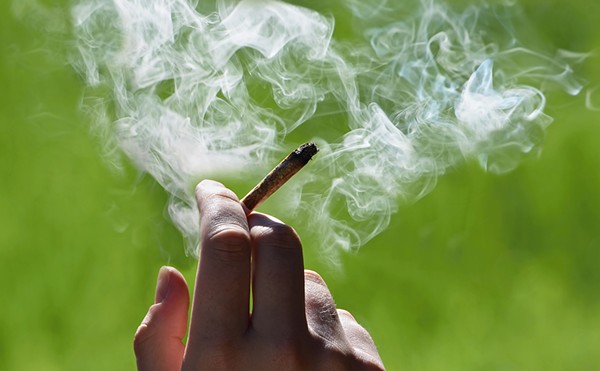The notion that this coming season will be the marijuana election in Michigan got a boost recently when gubernatorial candidate Shri Thanedar made a curious statement. He announced that if voters legalize recreational marijuana in November's election, then people imprisoned for low-level marijuana offenses should be released.
The notion seemed to come out of nowhere — just as Thanedar seems to have, as far as the politics are concerned. It was a surprise because expunging the records of those arrested is not the hot topic du jour for the marijuana crowd. The Coalition to Regulate Marijuana Like Alcohol has basically been lying low since turning the petitions to put the question on the ballot over to the state. Right now the ball is in the state's court on what to do.
Thanedar's statement is curious because it presupposes that the question will be on the ballot (we're still not sure yet) and then pass. Then he stakes out a position to the left of the CRMLA — which is pretty gutsy for anyone running for governor in Michigan.
Maybe he caught the news a couple of weeks ago that the district attorney of California's Alameda County intends to vacate thousands of past marijuana convictions.
It's happened elsewhere. Earlier, the San Francisco County district attorney announced plans to review, dismiss, and seal some 3,000 misdemeanor marijuana convictions going back to 1975. Actually, California's legalization that passed in 2016 included a provision that allowed people who have been convicted of marijuana crimes to have their charges lowered or wiped away.
Colorado, Maryland, New Hampshire, and Oregon have created avenues for marijuana convictions to be sealed or expunged. Massachusetts is looking at something similar, as well as Seattle. It seems a natural extension of rolling back prohibition to show retroactive justice to those whose original charges are no longer considered crimes.
This is important, because having a marijuana conviction can cripple a person's ability to get aid for education, or to find a job or housing. That means that if you are struggling, you are essentially blocked from many official means of getting back on your feet.
On top of that, since marijuana laws are unequally enforced in black and brown communities, the effects of the marijuana stigma are magnified for black and brown people. The ripple effect of marijuana stigma and disenfranchisement affects the entire community.
So why aren't we talking about it here? It's not that marijuana activists in Michigan don't support the notion — it's come up plenty during the course of the legalization push. It's just that the notion is a plus-one in the current effort to legalize marijuana.
"We expect to be able to do something with that after legalization is passed by the voters," says attorney Matt Abel, executive director of Michigan NORML. "Adding it to the current initiative could have been problematic, as it may have violated the single-subject rule for initiatives."
It's also just a bigger bite for voters to try to digest. So, you want to legalize marijuana and let all the marijuana convicts out of jail? That may be doable, but working on just one question at a time makes sense.
And it's not like somebody is going to forget about the issue. After Thanedar's press release, the other two leading Democratic hopefuls, Gretchen Whitmer and Abdul El-Sayed, agreed with the idea, as well as three Democratic attorney general candidates. None of the leading Republican candidates hopped on.
That brings out another point. Marijuana activists claim that legalization is not a partisan issue. That may be the case among grassroots activists, but when it comes to political office holders and candidates it is a partisan issue. From party platforms to legislative initiatives, Democrats have clearly been the political leaders in shaking off marijuana prohibition. A former state representative from Ann Arbor, Democrat Jeff Irwin, has been a star on the issue and should continue that in his current bid for the state Senate.
Republicans, relatively speaking, are all over the place. Traditional right-wingers trend negative against marijuana; libertarian-minded Republicans tend to prefer leaving it up to the people; the so-called alt right seems to be mixed up on the subject.
This is no endorsement for Thanedar. To be honest, he seems to be using the same let-me-entertain-you style that Rick Snyder used to introduce himself to the public. And while he claims the scientist label, he is also a businessman. In the age of Snyder and Trump, the results of putting entertaining businessmen into office don't look so good.
At the same time, Thanedar's approach to marijuana shows not only an enlightened attitude about marijuana, it displays a knack for keeping himself in the public consciousness in a game in which name recognition is half the battle — it may be even more. And it shows either courage, a savvy reading of the public mood, or a reckless crash-and-burn approach.
As much as things have relaxed regarding marijuana, in the past decade, the stigma of being involved with it is still strong. There are people who are openly and legally doing marijuana business who don't want to talk to me about it, don't want to talk on the record, don't want their names in the paper associated with it. They don't want their families to know what they're doing, they don't want business associates to know what they're doing, they don't want to attract attention from the authorities.
Part of it comes from the old stigmas, and part from a state government that has been downright antagonistic to the medical marijuana law from a law enforcement perspective, and slow to accommodate it from a legislative perspective.
Maybe that could change this year. And maybe some of the people who have had their lives damaged due to their nonviolent involvement with marijuana can get some restoration.
I'm no seer — and this Michigan election could go in any number of directions — but there are some indicators. It might be the Flint backlash election; it could be the Trump backlash blue wave election; it could be a red double-down on the Trump agenda election. It could be the green wave marijuana election. It could be more than one of them.
Actually, mixing the blue and green to create a nice aqua wave sounds pretty good right now.
Hash Bash is looming: The Hash Bash, now in its 47th year, is coming up on the first Saturday in April. That other notorious event, the Monroe Street Fair, marks its 17th year on April 7, with a full slate of the usual treats. Now another Hash Bash appendage has grown with the three-day Hash Bash Cup in its second year at the Wyndham Garden Hotel and Hampton Inn & Suites Friday through Sunday that weekend. With a few more tie-ins, Hash Bash will soon be the thing that ate Ann Arbor.







